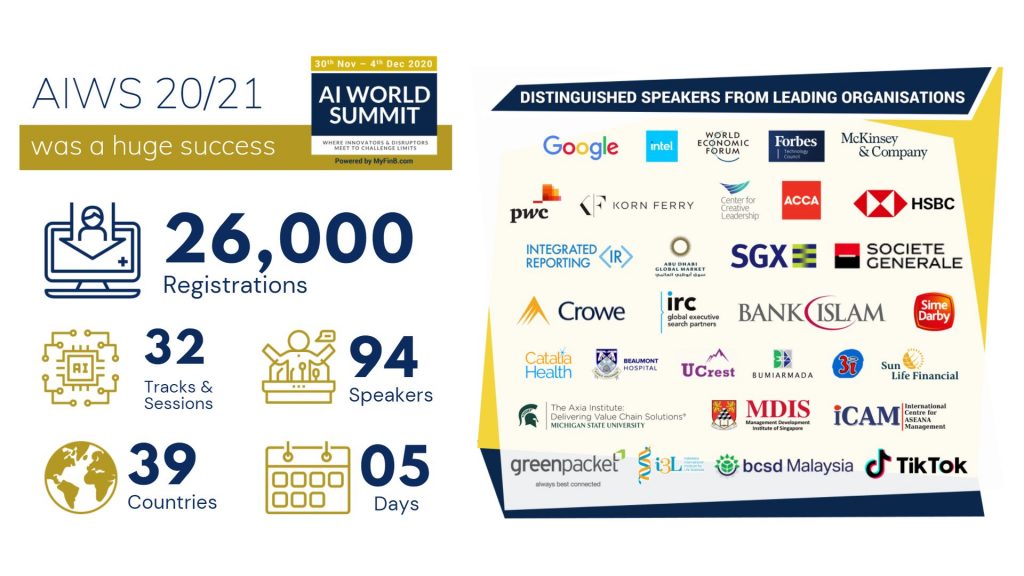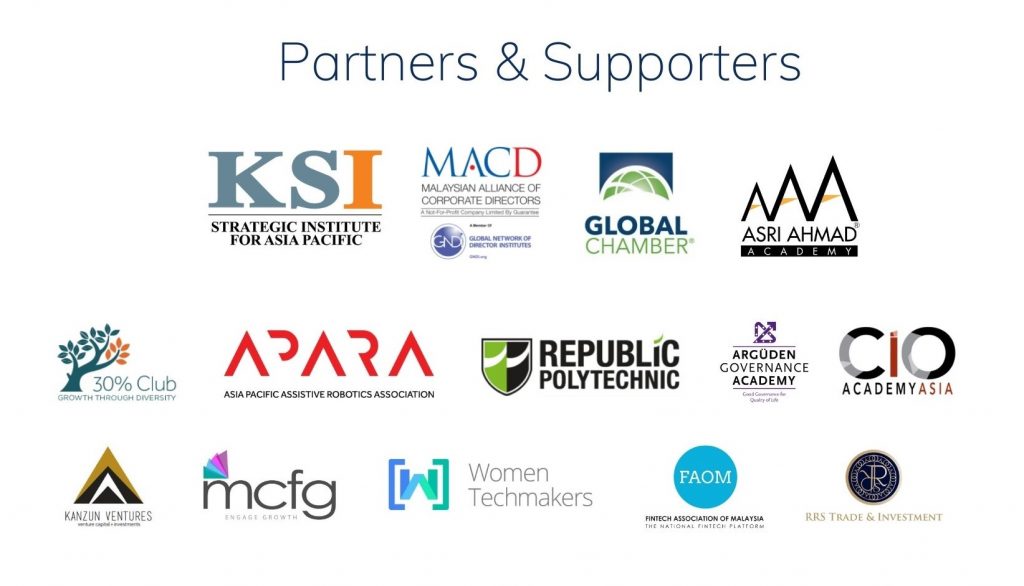

A Global Digital Event
AI WORLD SUMMIT 2021/22
‘The AI World Summit: Where Innovators & Disruptors Meet to Challenge Limits’ brings together the global AI community from a range of businesses, science and tech to go beyond the buzz and hype, discuss the most burning AI issues, share their developments, successes, challenges, and the resultant impact on their businesses.
The AI World Summit is a unique opportunity to explore what the new global era means to AI. It touches on how AI’s transformational potential can be best used to create a better future, and what this means for policy and decision makers, manufacturers and businesses interested in leveraging the potential, for the good of society and the business community.

Quote from Chairman, AIWS Committee
The AI World Summit is one of the world’s largest, most inclusive and vibrant events – when it comes to AI showcases, discussions and exchange of views, ideas and experiences in AI adoption and deployment by practitioners and global thought leaders.
The AIWS covers the hottest topics in AI and encourages a healthy debate, non-technical and strategic, for professionals, senior executives, board members and research personnel – ranging from public, private and non-profit organisations / NGOs.
AIWS provides a forum to ensure sustainable management of AI applications for positive impact.
Who Should Attend
AI / Analytics Experts
Data Scientists, Technical Personnel, Innovators, Transformation Leaders
Public & Private Organisations
Businesses, MNCs, Start-ups, Government Agencies, Universities and Colleges, Trade Associations and Business Chambers, Non-profit Organisations, Banks and Financial Institutions
Professionals & Academists
Professionals, Investors, Researchers, Lecturers, Students
AIWS 20/21: Recap Summary
AIWS 20/21 was a huge success.


AIWS 21/22: Priority Focus and Features
- The Grand Finale: 1st December 2021, from 9am - 9pm (GMT+8). A series of short interviews will be conducted with speakers individually and digitally curated based on each track.
- Total of 15 tracks : The latest, hottest AI trends; numerous speakers globally invited to share their thoughts on a specific set of questions.
- Converted into posters and digital clips; promoting digitally to a global audience of 11m professionals; digital networking via a knowledge portal.
- Publication of AI Playbook based on inputs collated from all speakers across tracks. Sentiment index relating to the 15 tracks will be measured and incorporated into the book over a 12-month period.
- Digital networking - continuously throughout the year. Participants can interact with one another before, during and after the event.

What Is Special This Time?
Series of roundtable discussions leading to grand finale
Curated content and quotes from experts globally in various fields
Sentiment index and emerging trends across core tracks
Publication of AI Playbook across Core Tracks
Launch and special promotion of Certification in Applied AI (CAAI) for AIWS delegates
UPCOMING WEBINAR SERIES LEADING TO THE AI SUMMIT 2021
Track 1 - 3
Track 4 - 6
Track 7 - 9
Track 10 - 12
Track 13 - 15

TRACK DETAILS [15]
#1 - Ethics & Artificial Intelligence

Key discussion points
- To what extent is bias a major problem in today’s AI systems? What effect is that bias having?
- Companies need to commit to “creating and implementing AI responsibly and ethically.” How is this process evolving?
- What are steps that companies can take to improve the ethical foundation in their AI systems?
- The future: If we look several years ahead, what can we expect to see for the future of AI and ethics?
As artificial intelligence plays an ever greater role in our world, the question of ethics in our use of AI gains greater urgency.
#2 - AI Perception & Reality

Key discussion points
- Where is the market in terms of real adoption of ML and AI?
- What are the data issues executives need to solve - or at least understand - before considering AI adoption?
- Challenges: What are the unstated assumptions that cause projects to get tripped up?
- "Plenty of AI projects end up as expensive science projects that businesses spend lavishly on, only to realize disappointment". Do you agree with this statement? Why or why not?
Given the hype surrounding artificial intelligence, businesses are now exceptionally eager to deploy this emerging technology.
#3 - Conversion Of Research Into AI

Key discussion points
- What are some of the innovative research work done by academicians globally? How impactful are these research projects for the community, industries or processes?
- Which sectors seem to be promising and impactful? How do we align between what industries need and what the universities are teaching?
- What are the key challenges faced by academicians when it comes to undertaking research projects?
- How will the future of research be augmented by AI?
Universities are poised to make new breakthrough by converting their academic research into AI systems.
#4 - Venture Capitalist vs Venture Building

Key discussion points
- Are these two approaches complementing or conflicting? Do they fill each other's gaps? If so, how?
- How should any of these be "modelled" for any AI deals? Please provide examples or scenarios.
- Which is the more effective model for Entrepreneurship and Innovation? Why is that so?
- Would there be any convergence between VC and VB, what can we expect to see ther interests in AI ventures in the near future, if any?
Creating value for entrepreneurs by way of dollar capital and expertise - but what do start-ups really need most?
#5 - Stock Investing & AI

Key discussion points
- What types of AI technology is being used to evaluate investment decisions? How do they work?
- What is AI saying about the current market situation and where is it expected to go in the coming future?
- Bottom-up versus Top-down investing approach - what is recommended for the short-term, and why? How could AI be deployed for either approach?
- Is AI better deployed for hunting small caps and midcaps or large caps in the coming quarter? What would AI be likely leaning towards?
Using Deep Learning AI to Predict the Stock Market: To what extent would this work for investment vs trading purposes?
#6 - AI, Cryptos & Central Bank Digital Currency (CBDC)

Key discussion points
- AI and Cryptocurrency – How can they work effectively together? How can AI run on top of cryptocurrency systems?
- How can data owners monetize their data in a blockchain environment and share the data with AI model creators?
- How can AI be used to evaluate cryptocurrencies? What is AI saying about the current market situation and where is it expected to go in the coming future?
- How will the future of crypto be augmented by AI?
The collaborative effort of blockchain technology and AI appears to be an undiscovered territory, yet widely talked about. Where are we on this?
#7 - Board Effectiveness Reviews Using AI

Key discussion points
- What are boards most concerned with nowadays? Do we see convergence or divergence of views across sectors, geographical regions, industry groups, etc?
- Boards that take a compliance-oriented approach - how should they prevent the loss of opportunity to the strategic aspects faced by the organisation?
- How can boards derive the highest value from a board assessment using AI?
- What are your views on diversity in terms of abilities, personalities, competencies of board members and the impact this bring to the organisation? What role can AI play in any of these?
Well-focused boards distinguish the adequate context in which to perform a supervisory role and in which to offer support to management.
#8 - Healthcare & AI

Key discussion points
- What types of AI technology are being used to evaluate patients globally? How do they work?
- What are the emerging medical trends affecting people in the near future?
- How are AI technologies being used for non-clinical aspects across healthcare providers?
- The future: how can AI help people in preventive healthcare rather than reactive?
AI to emulate human cognition in the analysis, interpretation, and comprehension of complicated medical and healthcare data.
#9 - AI & Governments

Key discussion points
- Are governments ready for the type of findings that AI provide? What have been the challenges for them to adopt and trust AI?
- Should AI be better used for frontline or policy making purposes? Which is of higher priority and why?
- How can AI be used to predict the future, for use by the government in the short to long term?
- What are the various strategies for governments to adopt for implementing AI?
Governments are looking to AI to improve their policymaking and service delivery. Two obstacles: the technology is often over-hyped, and the moral and ethical issues it raises.
#10 - Supply Chain & AI

Key discussion points
- What are some of the major technological-driven changes you've seen in the supply chain of goods and food supplies?
- What are some of the notable mismatches, if any, in the supply chain that you observe?
- What are the ways that AI can be deployed to help manufacturers and retailers deal with Covid effects?
- In future: what are the breakthrough technologies that can help leapfrog the supply chain process?
AI could optimize the delivery of goods while balancing supply and demand, and wouldn’t require human analysis except for the setting of parameters.
#11 - SDG Measurement Using AI

Key discussion points
- What are some of the current/emerging models being used to measure SDG?
- How do we overcome the challenges across the phases of pre/post implementation of SDG?
- What would be the relatively easiest and complex aspects of SDG measurement?
- What are the steps involved in the SDG measurement process?
- How can AI be deployed in those steps?
As organisations increasingly monitor and manage their contributions to the SDGs, the demand for good data is bound to grow. We expect to see a rise in data-driven social enterprises.
#12 - AI's Role in Governance, Risk & Compliance (GRC)

Key discussion points
- What are some of the current/emerging models being used to measure GRC activities?
- How do we overcome the challenges across the GRC functions?
- What would be the relatively easiest and complex aspects of GRC monitoring?
- What are the steps involved in GRC monitoring process?
- How can AI be deployed across the value chain of GRC?
Firms are looking for GRC solutions that can be deployed to large numbers of users without extensive training, yet able to deal with rising complexities.
#13 - Diversity & Board Performance

Key discussion points
- Do diverse boards perform better? What are the factors to consider when using the measurement yardstick?
- How can board diversity be improved? How can technologies such as AI can help in the shortlisting and selection process?
- "Businesses that consciously seek board diversity might be going about it the wrong way. Board diversity is an outcome, not a driver, of excellent governance." Do you agree with this statement? Why or why not?
- If you were to piece up your own board, what kind of member characteristics that you would seek for your Team A?
Companies are broadening the range of backgrounds for board member positions, allowing them to attract more "diverse" directors - does this create more impact?
#14 - The Future of Education

Key discussion points
- What are the major issues in education today? Are there key differences for such issues between developed and emerging economies?
- How can AI shape the way education is being learned or taught? Do you think there are social costs attached to learning via AI?
- What are the major edtech technologies that you find most fascinating and potentially impactful in the future?
- Does AI make students less smart?
Education is evolving, the results of a growing global population with a keen thirst for knowledge. But how can today's schools and universities prepare students for the future?
#15 - The Future of Cooperatives & Social Enterprises

Key discussion points
- What kind of challenges do you think cooperatives are facing during Covid times? How different would these challenges be compared to private enterprises?
- "Co-operative groups are challenged in interacting with the market, and understanding its needs and wants". Do you agree with this statement?
- What are the best operating models that cooperatives should pursue in the Covid era?
- How can cooperatives use AI to help them transform and/or address the identified key issues above?
Cooperatives can be powerful drivers of economic development for their communities. In spite of competing demands on financial resources, how can they promote economic development amidst Covid-19?
More details are being updated. Should you have any questions, please feel free to write to us at aisummit@myfinb.com
If you are interested to become a speaker at AIWS 21/22, please kindly fill up the form below.
Go to form: https://myfinb.com/aiws/2021-22/speaker-form